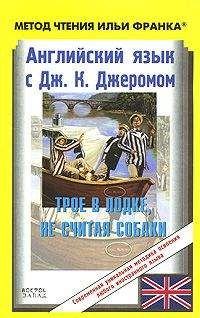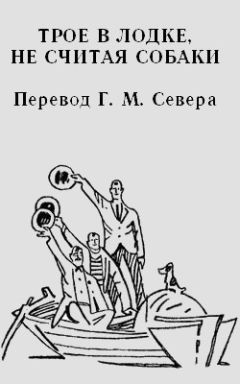Jerome Jerome - Английский язык с Джеромом К. Джеромом. Трое в лодке, не считая собаки
I shall never forget the picture of those two men (никогда не забуду картины тех двоих) walking up and down the bank with a tow-line, looking for their boat (которые ходили взад и вперед по берегу с буксирным канатом, разыскивая свою лодку).
One sees a good many funny incidents up the river in connection with towing (можно видеть довольно много забавных случаев на реке, связанных с буксировкой; a good many — довольно много; значительное количество). One of the most common is the sight of a couple of towers (одним из самых распространенных является зрелище двух тянущих /лодку/), walking briskly along, deep in an animated discussion (идущих энергично /по берегу/, погруженных в оживленную дискуссию = беседу), while the man in the boat, a hundred yards behind them (в то время как человек в лодке в сотне ярдов позади них), is vainly shrieking to them to stop (тщетно кричит им остановиться), and making frantic signs of distress with a scull (и подает неистовые знаки бедственного положения веслом = отчаянно размахивает веслом; distress — горе, несчастье; затруднительное, бедственное положение). Something has gone wrong (что-то случилось не то/что-то плохое произошло; to go wrong — сбиться с пути истинного, согрешить; не удаваться; выйти из строя /о машине и т. п./); the rudder has come off, or the boat-hook has slipped overboard (оторвался руль или багор выскользнул = упал за борт), or his hat has dropped into the water and is floating rapidly down stream (либо его шляпа упала в воду и быстро плывет вниз по течению).
incident [ˈɪnsɪd(ǝ)nt] shrieking [ˈʃri:kɪŋ]
We found the truant for them half a mile further down, held by some rushes, and we brought it back to them. I bet they did not give that boat another chance for a week.
I shall never forget the picture of those two men walking up and down the bank with a tow-line, looking for their boat.
One sees a good many funny incidents up the river in connection with towing. One of the most common is the sight of a couple of towers, walking briskly along, deep in an animated discussion, while the man in the boat, a hundred yards behind them, is vainly shrieking to them to stop, and making frantic signs of distress with a scull. Something has gone wrong; the rudder has come off, or the boat-hook has slipped overboard, or his hat has dropped into the water and is floating rapidly down stream.
He calls to them to stop, quite gently and politely at first (он просит их остановиться, сначала довольно кротко и вежливо).
"Hi! stop a minute, will you (эй, постойте минутку)?" he shouts cheerily (кричит он весело). "I've dropped my hat over-board (я уронил шляпу за борт)."
Then (потом): "Hi! Tom — Dick! can't you hear (не слышите)?" not quite so affably this time (не совсем любезно на этот раз).
Then: "Hi! Confound you, you dunder-headed idiots (черт вас возьми, пустоголовые идиоты; to confound — мешать; запутывать; проклинать: confound it! — к черту! будь оно проклято!; dunderhead — глупая башка, болван)! Hi! stop! Oh you — (ах вы…)!"
After that he springs up, and dances about (затем он вскакивает и прыгает по лодке; to dance — плясать, танцевать; скакать, прыгать), and roars himself red in the face (и орет до покраснения лица), and curses everything he knows (и ругает все и вся: «все, что знает»). And the small boys on the bank stop and jeer at him (и маленькие мальчики на берегу останавливаются и насмехаются над ним), and pitch stones at him as he is pulled along past them (и бросают в него камнями, когда его тянут /на лодке/ мимо них), at the rate of four miles an hour, and can't get out (со скоростью четырех миль в час, и /он/ не может выйти).
affably [ˈæfǝblɪ] confound [kǝnˈfaund]
He calls to them to stop, quite gently and politely at first.
"Hi! stop a minute, will you?" he shouts cheerily. "I've dropped my hat over-board."
Then: "Hi! Tom — Dick! can't you hear?" not quite so affably this time.
Then: "Hi! Confound you, you dunder-headed idiots! Hi! stop! Oh you — !"
After that he springs up, and dances about, and roars himself red in the face, and curses everything he knows. And the small boys on the bank stop and jeer at him, and pitch stones at him as he is pulled along past them, at the rate of four miles an hour, and can't get out.
Much of this sort of trouble would be saved (значительной части подобных неприятностей можно было бы избежать; to save — спасать; беречь, экономить; избавлять) if those who are towing would keep remembering that they are towing (если бы те, кто тянет /лодку/, продолжали помнить = не забывали, что они тянут), and give a pretty frequent look round to see how their man is getting on (и почаще оглядывались бы, чтобы посмотреть, как там их человек = спутник; to get on — делать успехи, преуспевать). It is best to let one person tow (самое лучшее — чтобы тянул один человек: «позволить тянуть одному»). When two are doing it, they get chattering, and forget (когда это делают двое, они начинают болтать и забывают), and the boat itself, offering, as it does, but little resistance (а сама лодка, оказывая, фактически, лишь небольшое сопротивление), is of no real service in reminding them of the fact (не особенно в состоянии напомнить им об их занятии/о действительности; of no use — бесполезный; of no effect — безрезультатный, бесполезный и т.д.; fact — факт, обстоятельство; событие; действительность).
As an example of how utterly oblivious a pair of towers can be to their work (как пример того, насколько совершенно невнимательными к своей работе может быть пара тянущих лодку; utterly — крайне, очень; oblivious — забывчивый, рассеянный; не обращающий внимания), George told us, later on in the evening (Джордж рассказал нам, позднее вечером), when we were discussing the subject after supper, of a very curious instance (когда мы обсуждали эту тему после ужина, об одном очень любопытном случае; instance — отдельный пример, случай).
frequent [ˈfri:kwǝnt] resistance [rɪˈzɪstǝns]
Much of this sort of trouble would be saved if those who are towing would keep remembering that they are towing, and give a pretty frequent look round to see how their man is getting on. It is best to let one person tow. When two are doing it, they get chattering, and forget, and the boat itself, offering, as it does, but little resistance, is of no real service in reminding them of the fact.
As an example of how utterly oblivious a pair of towers can be to their work, George told us, later on in the evening, when we were discussing the subject after supper, of a very curious instance.
He and three other men, so he said, were sculling a very heavily laden boat up from Maidenhead one evening (он и трое других, как он сказал, вели тяжело груженную лодку вверх /по реке/ из Мэйденхеда как-то вечером; to lade — грузить, нагружать), and a little above Cookham lock they noticed a fellow and a girl, walking along the towpath (и несколько выше Кукхэмского шлюза они заметили парня и девушку, шедших по дороге на берегу; towpath — пешеходная дорога на берегу реки, канала), both deep in an apparently interesting and absorbing conversation (оба поглощенные очевидно интересным и увлекательным разговором). They were carrying a boat-hook between them (они несли багор /между собой/), and, attached to the boat-hook was a tow-line (а к багру был привязан канат), which trailed behind them, its end in the water (который волочился за ними, а его конец был в воде = скрылся под водой). No boat was near, no boat was in sight (поблизости не было лодки, и никакой лодки не было в пределах видимости). There must have been a boat attached to that tow-line at some time or other, that was certain (лодка была привязана к этому канату когда-то: «в то или иное время», это было несомненно); but what had become of it, what ghastly fate had overtaken it (но что с ней случилось, какая ужасная участь постигла ее; to overtake-overtook-overtaken; to overtake — догнать, настигнуть; охватить, обрушиться внезапно), and those who had been left in it, was buried in mystery (и тех, кто был оставлен в ней, — было окутано тайной; to bury — хоронить; прятать, укрывать).
Whatever the accident may have been, however (какое бы несчастье ни случилось, тем не менее), it had in no way disturbed the young lady and gentleman, who were towing (оно никоим образом не беспокоило барышню и молодого джентльмена, которые тянули /лодку/). They had the boat-hook and they had the line (у них были багор и веревка), and that seemed to be all that they thought necessary to their work (и это, казалось, все, что они считают необходимым для своей работы = все, что им нужно).
accident [ˈæksɪd(ǝ)nt] necessary [ˈnesɪs(ǝ)rɪ]
He and three other men, so he said, were sculling a very heavily laden boat up from Maidenhead one evening, and a little above Cookham lock they noticed a fellow and a girl, walking along the towpath, both deep in an apparently interesting and absorbing conversation. They were carrying a boat-hook between them, and, attached to the boat-hook was a tow-line, which trailed behind them, its end in the water. No boat was near, no boat was in sight. There must have been a boat attached to that tow-line at some time or other, that was certain; but what had become of it, what ghastly fate had overtaken it, and those who had been left in it, was buried in mystery.
Whatever the accident may have been, however, it had in no way disturbed the young lady and gentleman, who were towing. They had the boat-hook and they had the line, and that seemed to be all that they thought necessary to their work.
George was about to call out and wake them up (Джордж собирался крикнуть и разбудить их; to be about to do something — собираться, намереваться сделать что-либо), but, at that moment, a bright idea flashed across him, and he didn't (но в ту минуту великолепная идея/мысль промелькнула у него в голове, и он не стал /кричать/). He got the hitcher instead, and reached over (он взял багор вместо этого, протянул его), and drew in the end of the tow-line (и втянул /в лодку/ конец каната); and they made a loop in it, and put it over their mast (и они сделали на нем петлю, и накинули на свою мачту), and then they tidied up the sculls (а потом подобрали весла; to tidy — убирать; приводить в порядок), and went and sat down in the stern, and lit their pipes (и сели на корме, и зажгли трубки; to light).
And that young man and young woman towed those four hulking chaps and a heavy boat up to Marlow (и молодой человек c девушкой тянули тех четырех увесистых парней и тяжелую лодку до Марлоу; hulking — громадный, массивный; неповоротливый, неуклюжий).
George said he never saw so much thoughtful sadness concentrated into one glance before (Гаррис сказал, он никогда прежде не видел столько задумчивой печали, сосредоточенной в одном взгляде), as when, at the lock, that young couple grasped the idea (как когда у шлюза эта молодая пара схватила идею = поняла) that, for the last two miles, they had been towing the wrong boat (что последние две мили они тянули не ту лодку). George fancied that, if it had not been for the restraining influence of the sweet woman at his side (Джордж предположил, что, если бы не сдерживающее влияние милой женщины на него /юношу/; side — сторона, бок; позиция, точка зрения), the young man might have given way to violent language (молодой человек поддался бы резким словам = не удержался бы от брани).



